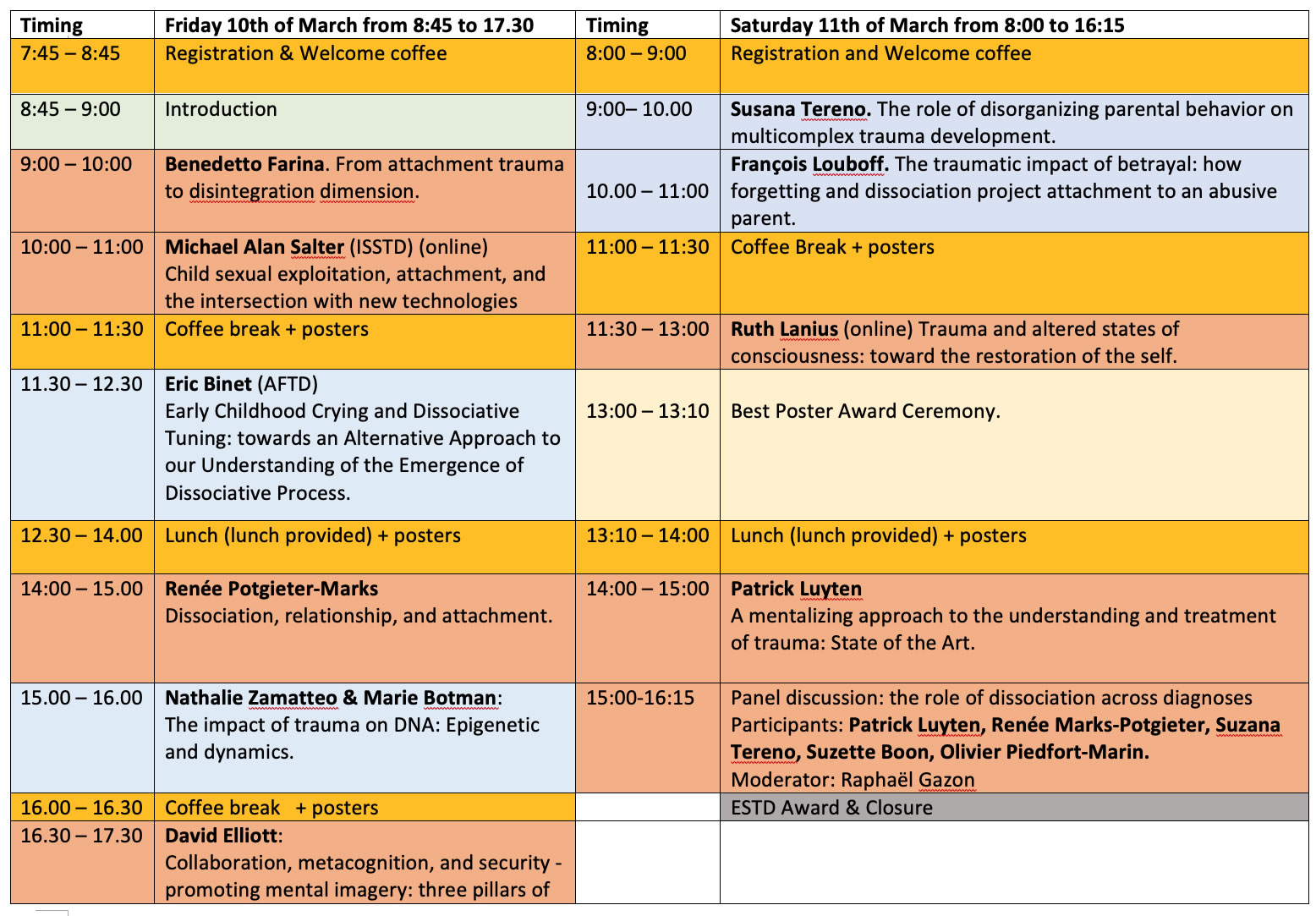ESTD - AFTD Conference 2023
When Attachment Meets Trauma:
Disorganization and Dissociation From Childhood to Adulthood.
Preconference Workshops and Conference
DoubleTree Brussels Hotel, 9 - 11 March 2023 - Brussels
Conference Programme
Conference Programme


Programme in detail
Friday 10 March
Registration and Welcome Coffee
Introduction

Keynote 1
From Attachment Trauma to Disintegration Dimension.
Benedetto Farina

Keynote 2 (on-line)
Child Sexual Exploitation, Attachment, and the Intersection with New Technologies.
Michael Alan Salter
Coffee Break, posters on display

Keynote 3
Early Childhood Crying and Dissociative Tuning:
Towards an Alternative Approach to our Understanding of the Emergence of Dissociative Process.
Eric Binet
Lunch Break (lunch provided) , posters on display

Keynote 4
Dissociation, Relationship and Attachment.
Renée Potgieter Marks


Keynote 5
The Impact of Trauma on DNA. Epigenetic Dynamics.
Nathalie Zammatteo and Marie Botman
Coffee Break, posters on display

Keynote 6
Collaboration, Metacognition, and Security-Promoting Mental Imagery: Three Pillars of Therapy for Resolving Disorganized Attachment.
David Elliott
Presentation of the AFTD-EJTD prize for the best article in french 2022.
AFTD General Assembly
ESTD: Meeting with ESTD Country Representatives and ESTD members
Drink for the AFTD members.
Dinner at the Comic Strip Museum (Centre Belge de la Bande Dessinée)
Address: Rue des Sables 20, 1000 Brussels

An accomplished attraction located in the heart of Brussels, the Belgian Comic Strip Center has been honouring the creators and heroes of the 9th Art for more than 25 years.
The regularly renewed permanent exhibitions and a diversified programme of temporary exhibitions enable visitors to discover the countless aspects of comics art. Tintin and the Smurfs lead the way towards further adventures, an encounter with a world where creativity has no limits.
Enhanced by an exceptional Art Nouveau home designed by Victor Horta, the Belgian Comic Strip Center is just as much a tribute to the pioneers as a glimpse of contemporary comics art.
Saturday 11 March
Registration and Welcome Coffee

Keynote 7
The Role of Disorganizing Parental Behavior on multicomplex Trauma Development.
Susana Tereno

Keynote 8
The Traumatic Impact of Betrayal: How Forgetting and Dissociation Project Attachment to an Abusive Parent.
François Louboff
To protect their attachment to and relationship with their abusive parent, child victims are forced to turn a blind eye to the betrayal they suffer at the hands of the person who should be protecting them and on whom they are dependent. They are able to do this by keeping information that poses a threat to their attachment system at bay. We will look at how betrayal trauma is particularly toxic not only for psychological and somatic health, but also for relationships with others.
Coffee Break and discovery of the posters

Keynote 9
Trauma and Altered States of Consciousness: Toward the Restoration of the Self.
Ruth A. Lanius
Best Poster Award Ceremony
Lunch Break (lunch provided) and discovery of the posters
